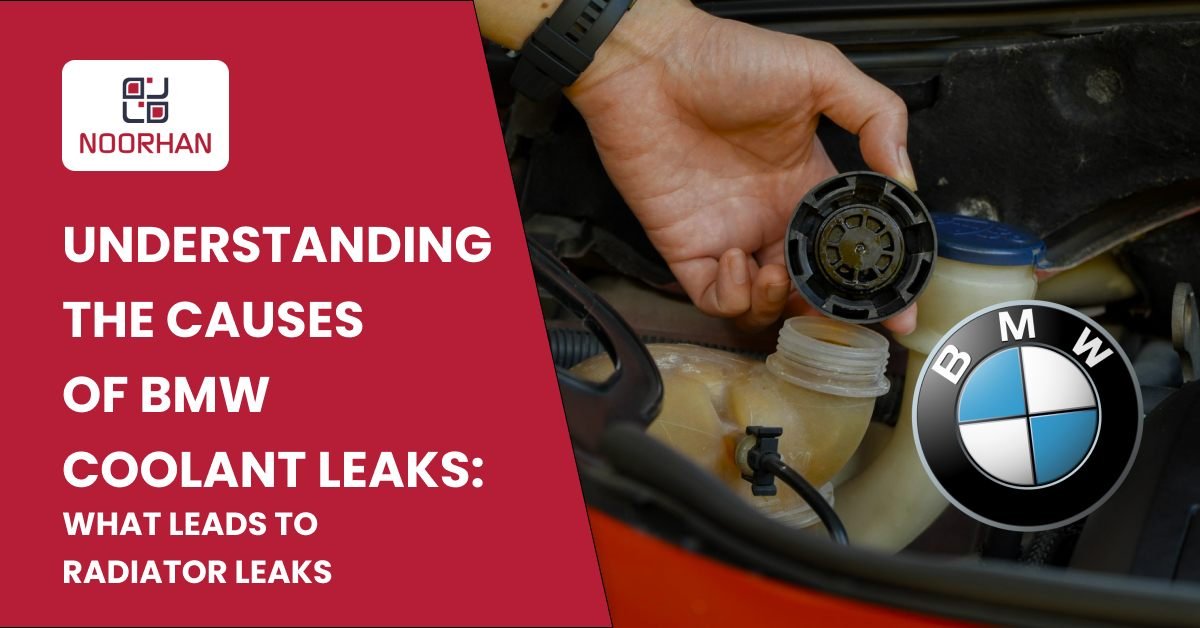-
Role of BMW CoolantRole of BMW Coolant
-
Causes of BMW Radiator LeaksCauses of BMW Radiator Leaks
-
Diagnosing BMW Coolant LeaksDiagnosing BMW Coolant Leaks
-
Preventing BMW Coolant LeaksPreventing BMW Coolant Leaks
-
When to Seek Professional HelpWhen to Seek Professional Help
As a proud BMW owner, you understand the importance of maintaining your vehicle for optimal performance. One critical aspect of vehicle maintenance is monitoring the cooling system, particularly for coolant leaks. Among the various potential issues, radiator leaks are among the most common. In this comprehensive guide, we’ll delve into the causes of BMW coolant leaks, with a particular focus on radiator issues, to ensure you keep your BMW running smoothly.
The Role of BMW Coolant in Your Vehicle
Before we explore the causes of coolant leaks, it’s essential to understand the role of coolant in your BMW. Coolant, often referred to as antifreeze, is a specially formulated liquid that circulates through your engine, absorbing heat to prevent overheating. It also protects against corrosion and freezing in extreme temperatures, playing a crucial role in your vehicle’s overall health and longevity.
Why Coolant Leaks Are Concerning
A coolant leak, regardless of size, should never be taken lightly. Here are several reasons why:
- Risk of Engine Overheating: Insufficient coolant levels can lead to engine overheating, potentially causing severe damage.
- Reduced Fuel Efficiency: Overheating can cause your engine to work harder, leading to decreased fuel efficiency.
- Compromised Performance: A coolant leak can hinder the engine’s ability to maintain optimal operating temperature, affecting performance and reliability.
With this understanding, let’s investigate the common causes of coolant leaks in BMW vehicles, specifically focusing on radiator-related issues.
Common Causes of BMW Radiator Leaks
1. Radiator Corrosion and Aging
The radiator is a vital component of your BMW’s cooling system. Over time, exposure to heat and pressure can lead to corrosion and deterioration of the radiator’s metal and plastic parts. This can manifest in several ways:
- Cracks in the Radiator Core: As the radiator ages, cracks may develop in the core, leading to leaks.
- Separation of Plastic End Tanks: Many BMW radiators feature plastic end tanks that can become brittle and separate from the metal core over time.
- Pinhole Leaks in the Fins: The fins in the radiator can develop small holes due to corrosion, leading to coolant loss.
2. Physical Damage
Your BMW’s radiator is also susceptible to physical damage from road debris, minor collisions, or even from improper installation. Common issues include:
- Punctures in the Radiator Core: A sharp object can puncture the radiator, causing coolant to leak.
- Bent or Damaged Fins: Damage to the radiator fins can restrict airflow, causing the radiator to overheat and potentially leading to leaks.
- Cracked Plastic Components: Even minor impacts can lead to cracks in the plastic parts of the radiator, resulting in leaks.
3. Faulty Water Pump
The water pump is responsible for circulating coolant throughout the engine. A malfunctioning water pump can result in leaks, often presenting symptoms such as:
- Coolant Dripping from the Front of the Engine: If you notice coolant pooling under the front of your BMW, the water pump may be the culprit.
- High-Pitched Whining Noise: A failing water pump may produce unusual sounds as it struggles to circulate coolant.
- Engine Overheating: Without proper circulation, your engine can overheat, leading to potential damage.
4. Worn or Damaged Hoses
The cooling system in your BMW relies on various hoses to transport coolant. These hoses can develop leaks due to:
- Age-Related Deterioration: Over time, hoses can become brittle and crack, leading to leaks.
- Cracks from Heat and Pressure: Constant exposure to heat can weaken hoses, causing them to split.
- Loose or Damaged Clamps: If the clamps securing the hoses are loose or damaged, coolant can escape.
Regular inspections of your BMW’s hoses can help catch these potential issues before they escalate.
5. Expansion Tank Issues
The expansion tank, or coolant reservoir, is another common source of leaks. Problems associated with the expansion tank include:
- Cracks in the Plastic Tank: Over time, the plastic tank can develop cracks due to thermal stress.
- Faulty Cap Seals: A malfunctioning cap seal can allow coolant to escape, leading to leaks.
- Damaged Overflow Hose Connections: Issues with the overflow hose can also result in coolant leaks.
These problems can often be traced back to the constant heating and cooling cycles that the expansion tank undergoes.
6. Thermostat Housing Failure
The thermostat housing can also be a source of coolant leaks. Possible issues include:
- Warping from Heat Exposure: Prolonged exposure to high temperatures can warp the housing, leading to leaks.
- Cracks in the Plastic Housing: Similar to other plastic components, the thermostat housing can crack, causing coolant to escape.
- Deteriorated Gaskets: The gaskets sealing the thermostat housing may deteriorate over time, leading to leaks.
7. Head Gasket Failure
Although less common, a blown head gasket can cause coolant leaks. Signs of a head gasket failure include:
- White Exhaust Smoke: This can indicate coolant entering the combustion chamber.
- Milky Oil: If you notice a milky substance on your oil dipstick, it could mean coolant is mixing with the oil.
- Unexplained Coolant Loss: If you frequently need to top off your coolant, it could be a sign of a head gasket issue.
- Engine Overheating: A blown head gasket can lead to overheating, necessitating immediate attention.
Diagnosing BMW Coolant Leaks
Identifying the source of a coolant leak can be challenging. Here are some signs to look out for:
- Visible Coolant Puddles: Puddles of coolant under your BMW can indicate a leak.
- Sweet, Syrupy Smell: Coolant has a distinct smell that can help identify leaks.
- Low Coolant Level Warnings: Dashboard warnings regarding low coolant levels should be addressed promptly.
- Engine Overheating: If your engine is overheating, it could be due to insufficient coolant.
- White Exhaust Smoke: This can be a sign of coolant entering the combustion chamber.
If you notice any of these symptoms, it’s crucial to have your BMW inspected by a professional as soon as possible.
Preventing BMW Coolant Leaks
While some coolant leaks are unavoidable due to normal wear and tear, there are proactive steps you can take to minimize the risk:
- Regular Maintenance: Follow BMW’s recommended service schedule for coolant system checks and flushes.
- Use the Right Coolant: Always use BMW-approved coolant to ensure compatibility with your vehicle’s cooling system.
- Address Small Issues Promptly: Don’t ignore minor leaks or warning signs, as they can quickly escalate into more serious problems.
- Monitor Engine Temperature: Keeping an eye on your temperature gauges can help you catch cooling system issues early.
- Inspect Hoses and Connections: Regularly check coolant hoses and connections for signs of wear or damage.
Read in detail: The Ultimate Guide to BMW Spare Parts
When to Seek Professional Help for BMW Coolant Leaks
While minor coolant leaks can sometimes be handled by DIY enthusiasts, it’s often best to consult a professional BMW technician, especially if:
- You’re unsure about the source of the leak.
- The leak is substantial or recurring.
- You notice signs of engine overheating.
- Your BMW is still under warranty.
- You lack the tools or expertise to properly diagnose and repair the issue.
A qualified BMW technician can accurately diagnose the cause of your coolant leak and provide the appropriate solution, ensuring your vehicle’s longevity and performance.
Conclusion: Maintaining Your BMW’s Cooling System
BMW coolant leaks can be concerning, but with prompt attention and proper care, they are often manageable. By understanding the common causes of coolant leaks and staying vigilant for warning signs, you can help prevent minor issues from escalating into major problems.
Remember, your BMW’s cooling system is crucial for maintaining optimal engine performance and longevity. Regular maintenance, using the correct BMW coolant, and addressing any leaks promptly will go a long way in keeping your Ultimate Driving Machine in top shape.
If you ever find yourself unsure about a potential coolant leak or any other issue with your BMW, don’t hesitate to consult with a professional. Your local BMW dealership or a reputable independent BMW specialist can provide expert advice and service to keep your vehicle in excellent condition.
By staying informed and proactive about your BMW’s cooling system health, you can enjoy the performance and reliability that make BMW vehicles so special. Happy driving, and may your coolant stay where it belongs – in your engine!









